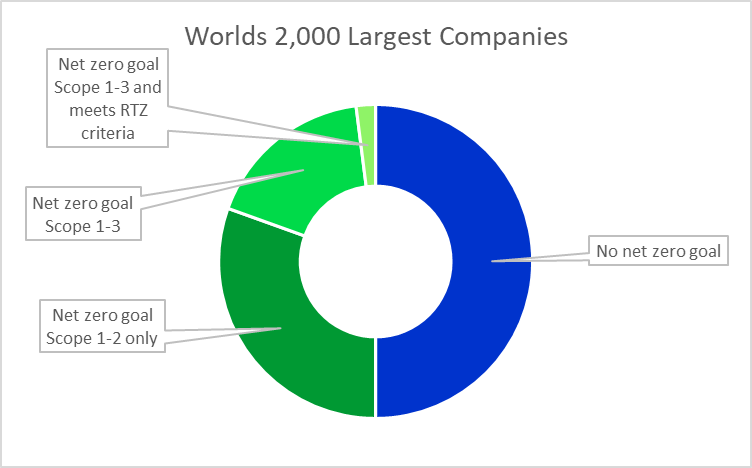Targets to Traction: Accelerating Corporate Climate Ambition into Real Action
The Paris Agreement has driven climate ambition, but the truth is we’re falling short of our goals. Today, global emissions are not being reduced fast enough to reach targets and slow climate change. More ambition and action are needed from governments and companies.
Now with COP28 just days away, we recently surpassed a significant milestone in corporate climate commitments. According to the Net Zero Tracker, half of the world’s 2,000 largest publicly listed companies have now set net zero targets. These companies collectively generate $27 trillion in annual revenue and employ tens of millions of people globally, underscoring their ability to drive meaningful impact.
Momentum on climate from the private sector is unmistakably building. In just the past 16 months, large corporate net zero targets have surged by over 40%. For context, in June 2022, only 700 of these companies had set net zero targets. For the remaining 1,000 companies, this should serve as a compelling call to action to establish their climate goals. Time is of the essence.
The Intergovernmental Panel on Climate Change emphasizes that to achieve the Paris Agreement’s goal of limiting global warming to 1.5° Celsius by 2050, we must peak carbon emissions by 2025 and halve them by 2030. With these deadlines fast approaching, companies must be setting credible climate commitments and taking concrete actions toward net zero goals.
Unfortunately, a significant portion of the 1,000 net zero commitments made by the largest global companies falls short of the basic criteria for credible climate goals. According to the Net Zero Tracker’s 2023 Net Zero Stocktake, less than 40% of these targets cover scope 3 value chain emissions, and a mere 4% meet the revised ‘starting line criteria’ set by the UN Race to Zero Campaign for reducing emissions across all scopes swiftly and fairly in line with science, with transparent action plans, robust near-term and long-term targets, and annual reporting against their progress. This highlights the need for stronger, more credible targets aligned with science-backed climate goals.

While goal setting demonstrates commitment, it must be coupled with tangible action to meet climate goals. Companies stall in their climate efforts for several reasons:
1. Measurement hurdles. The increasing emphasis on greenhouse gas (GHG) measurement, while crucial for disclosure and legal compliance, should not impede climate action. Basic estimates of corporate GHG footprints can identify emission hotspots, paving the way for targeted mitigation actions.
2. Organizational challenges. Despite executive commitments to net zero, significant organizational changes are necessary for progress. This involves creating new structures, teams, and incentives to ensure alignment and contribution across all business functions.
3. Financial constraints. Many climate projects lack a robust budget and financial resources. To address this, align decision making processes to prioritize investment in climate projects and leverage incentives provided by government policies, such as the IRA, to facilitate the flow of capital toward climate implementation.
4. Workforce resources. Sustainability teams are often small, and they rely on other teams to implement their work. Educating staff in critical business functions on climate-related topics can create climate champions within teams like finance and procurement, ensuring greater support and implementation of climate projects. Bringing in external expertise, such as a Climate Corps fellow, can also help build internal capacity for climate project implementation.
Helping companies moving from climate ambition to action is one of the reasons we created the Net Zero Action Accelerator, to support corporate professionals as they navigate the complex climate space by connecting them with the best tools and actionable resources for streamlined implementation of climate initiatives.
While celebrating the increasing corporate ambition on climate, we must accelerate driving tangible action toward these goals. With COP28 looming, let’s proactively address emissions, enabling us to report real progress on corporate climate goals.